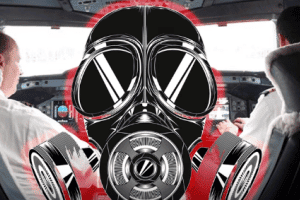
Toxic Airplane Cabin Air Injury Lawsuits. Everyday, thousands of airplane passengers could be breathing toxic air. The problem has become so common that the headaches, breathing problems and other symptoms caused by toxic airplane cabin air have been given an unofficial name: Aerotoxic Syndrome. These symptoms are the result of breathing toxic fumes that regularly […]

Toxic Airplane Cabin Air Injury Lawsuits. Everyday, thousands of airplane passengers could be breathing toxic air. The problem has become so common that the headaches, breathing problems and other symptoms caused by toxic airplane cabin air have been given an unofficial name: Aerotoxic Syndrome. These symptoms are the result of breathing toxic fumes that regularly circulate throughout many commercial airline cabins. While the health affects of toxic airplane cabin air are often short-lived, in some individuals, Aerotoxic Syndrome may result in persistent neurological problems.
Lawyers at our firm who specialize in toxic substances litigation are investigating health problems caused by toxic airplane cabin air and Aerotoxic Syndrome. If you have experienced headaches, breathing issues, vision problems, or any other symptom following air travel, you may be entitled to compensation. To find out how we can help you, please contact our toxic substances lawyers today.
The issue of toxic airplane cabin air is a controversy that has dogged the airline industry for years. In order to make airplane cabin suitable for breathing during flight, it must be pressurized, heated, and then circulated to the passenger. Most commercial planes are designed to make cabin air by drawing in a compressed supply of it from plane engines. Typically, this “bleed air” is mixed with existing cabin air and recirculated throughout the flight.
Critics claim the system used to re-circulate air in most airplanes does not always remove fumes or vapors from the engine. If the system malfunctions or as it wears out over time, chemical contaminants – including fumes from the oil that lubricates the engine – can circulate through the airplane, creating a fume event. Sometimes so much oil mixes with air being drawn into the cabin that passengers will literally be able to see fumes and smoke filling the cabin.
The lubrication oil that produces a fume event is made with many toxic chemicals, including tricresyl phosphate (TCP), a known neurotoxin. Other toxins, including nickel, cadmium and beryllium, can also be drawn into bleed air. According to the Aerotoxic Association, these toxins cause damage to the central nervous system that varies from person to person.
Airlines and the makers of aircraft, not surprisingly, deny the existence of Aerotoxic Syndrome. Ironically though, they have developed technology to prevent it. The new Boeing 787 Dreamliner is the first one in over 40 years to be created using this safe technology, in which cabin air is not supplied by using bleed air, but rather by electrically-driven compressors.
According to the Aerotoxic Association, the Boeing 787 Dreamliner’s anti-bleed technology is the obvious answer to the problem of toxic airplane cabin air. But even in today’s existing bleed-air airplanes, airlines could take steps to reduce the risk of Aerotoxic Syndrome that would be relatively inexpensive to implement. According to the Aerotoxic Association, these precautions include installation of bleed air filtration systems, use of a less toxic oil formulation, and air contamination detectors in bleed air supplies.
The symptoms of Aerotoxic Syndrome can vary greatly from person to person. According to the Global Cabin Air Quality Executive (GCAQE), short-term symptoms of Aerotoxic Syndrome can include:
According to the Aerotoxic Association, symptoms of the syndrome are sometimes mistaken for other disorders, including Chronic Fatigue Syndrome, Multiple Chemical Sensitivity, “mysterious” viral infections, sleep disorders, depression, stress or anxiety. Mild cases of Aerotoxic Syndrome will often resolve on their own. However, according to the Aerotoxic Association, more severe cases, which may involve neurological injuries, may require the attention of various medical specialists.
If you believe you or a loved one is suffering from Aerotoxic Syndrome, you may have valuable legal rights. To discuss your case with one of our toxic substances lawyers, please fill out our online form, or call 1-800-YOURLAWYER (1-800-968-7529) today.


